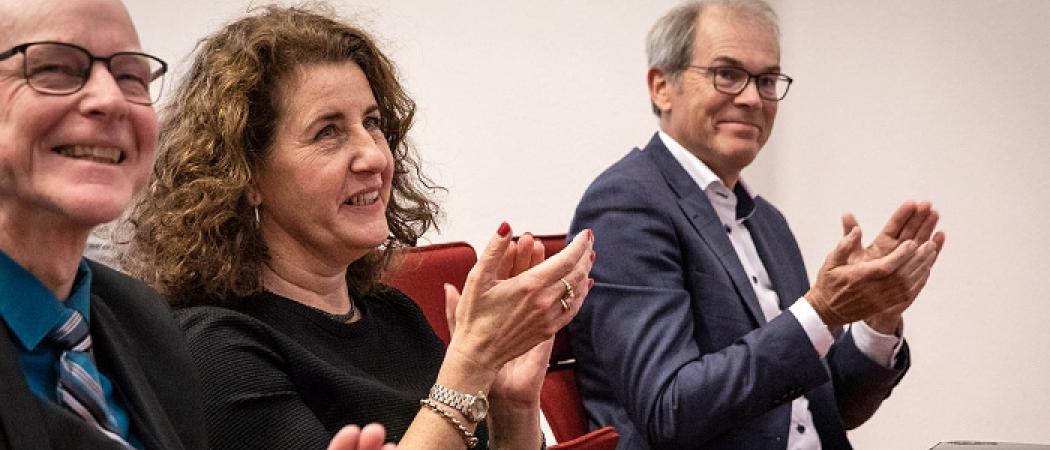
Minister of Education, Ingrid van Engelshoven (centre) and AUAS Rector, Geleyn Meijer (right). Photo: Dingena Mol
When it comes to embedding entrepreneurship and innovation in higher education institutions, the Netherlands is ahead of its European peers. The Amsterdam University of Applied Sciences (AUAS) is one of the institutions that performs well on this front, thanks to its priority area Entrepreneurship.
A new pan-European study commissioned by the Organisation for Economic Co-operation and Development (OECD) and the European Commission (EC) surveys the Dutch entrepreneurial environment in detail, shedding light on best practices and areas for improvement.
This was the crux of an event hosted by the AUAS on 1 October. The afternoon brought together a delegation of representatives from the OECD, the EC, the AUAS and the Dutch government –including guest of honour, Dutch Minister of Education, Culture & Science, Ingrid van Engelshoven, who officially received the report.
The Netherlands leads the way
The report, ‘Supporting Entrepreneurship and Innovation in Higher Education in the Netherlands’, was published by HEInnovate, a think tank for higher education institutions (HEIs) and joint initiative of the OECD and EC.
Based on field research among eight Dutch HEIs, including the AUAS, the report analysed their strategies and practices for fostering entrepreneurship and innovation – key drivers of economic and social development.
Why does the Netherlands perform well in this area? Public policy is a key success factor. In 2010, the Dutch government introduced a so-called ‘Valorisation Programme’. This public policy programme focuses on bridging the gap between research and its practical applications, often referred to as ‘knowledge transfer’ in layman’s terms.
“The Dutch concept of valorisation has proven so influential that is has entered the OECD vocabulary and framework for assessing entrepreneurialism within HEInnovate. The Netherlands champions this theme, providing best practice examples for other countries,” said Raffaele Trapasso, OECD Economist, during the report presentation.
Embedding entrepreneurialism at AUAS
Examples of entrepreneurship best practice at AUAS are interwoven in the report, such as the Knowledge Mile, which is cited as an example of “how HEIs in the Netherlands act as driving forces for entrepreneurship and innovation in regional, social and community development.” AUAS is also commended for integrating valorisation activities in the job profiles of professors, lecturers and researchers. According to the report, AUAS serves as an example for other HEIs, who can learn from our efforts to integrate “valorisation activities within recruitment criteria, staff contracts and promotional processes.”
During the presentation, Professor of Entrepreneurship, Ingrid Wakkee, gave concrete examples of how AUAS embeds the theme throughout the organisation. “We’ve made a strong commitment to entrepreneurship at all levels. We have five minors focused on starting your own business, many courses related to this theme and student entrepreneurs can conduct their graduation research project within their own companies. The vocational nature of education at AUAS demands an entrepreneurial mind set – it’s a competency that we expect our students to develop by the time they graduate, regardless of the discipline.”
Justin Cobelens, AUAS fourth-year Aviation Engineering student and founder of Toupr, shared his experience of starting a business while studying. His company connects high school students with higher education students for the purpose of co-studying. This results in better focus and grades for the younger student – and an income for the student mentor. He explained that his business received a boost thanks to AUAS courses on entrepreneurship and the 10K Pre-incubator programme, which supports start-ups created by students and staff.
AUAS Rector Geleyn Meijer stressed that knowledge transfer via practice-based research is a defining strength at AUAS. “We are very closely connected to society. The real problems that need to be solved in Amsterdam define our research focus. We are educating our students to create real impact from day one.”
Minister Van Engelshoven: ‘research on impact a priority’
This timing of this event, in the wake of further governmental budget cuts for higher professional education institutions (HBO), did not go unnoticed. The report underlines the importance of sufficient government funding of higher education, at a time when investment is scarce. Key recommendations in the report include guaranteeing ongoing funding for the Valorisation Programme. The current funding period ends in 2018.
During her speech, Minister Van Engelshoven acknowledged the need for structural funding of research into the impact of entrepreneurship education. “Entrepreneurship and innovation are essential components to higher education in the Netherlands and to society as a whole. There is however a need for more research into the impact of entrepreneurial education on students and start-ups. I will prioritise this during the Global Entrepreneurship Week in November, and have earmarked funds for this purpose.”
The Amsterdam Experiment
Wrapping up by linking research and practice, the afternoon ended with Minister Van Engelshoven meeting AUAS researchers and partners involved in the so-called Amsterdam Experiment. In this project, AUAS researchers are analysing the effects of the Amsterdam municipality’s programme to offer welfare recipients more freedom in the workforce reintegration process.
This release was first published 03 October 2018 by the Amsterdam University of Applied Sciences





 A unique international forum for public research organisations and companies to connect their external engagement with strategic interests around their R&D system.
A unique international forum for public research organisations and companies to connect their external engagement with strategic interests around their R&D system.